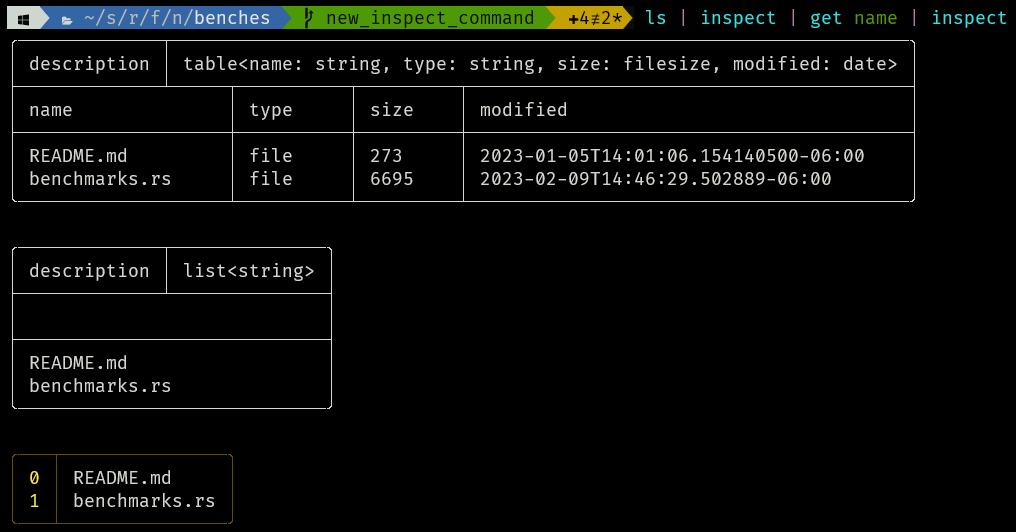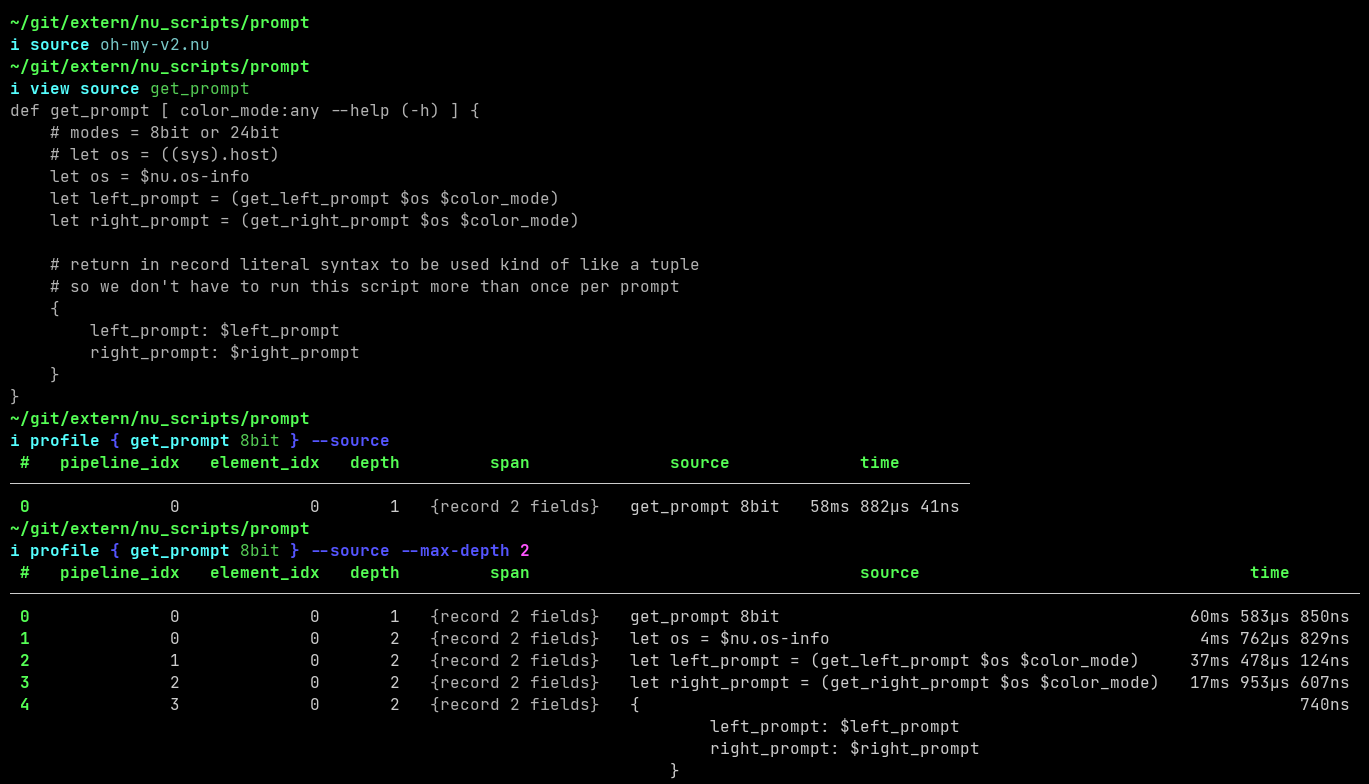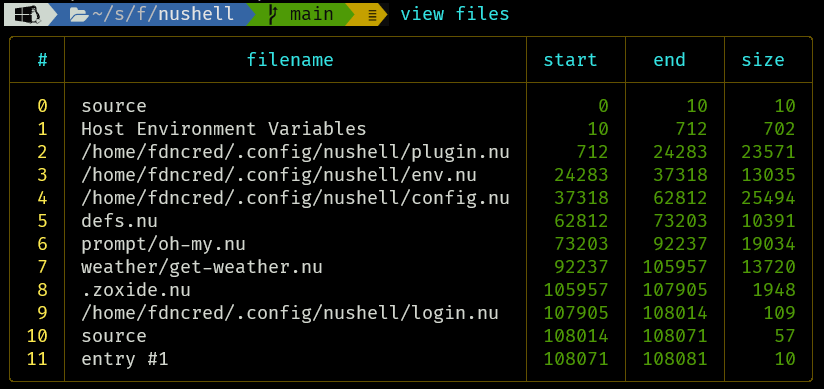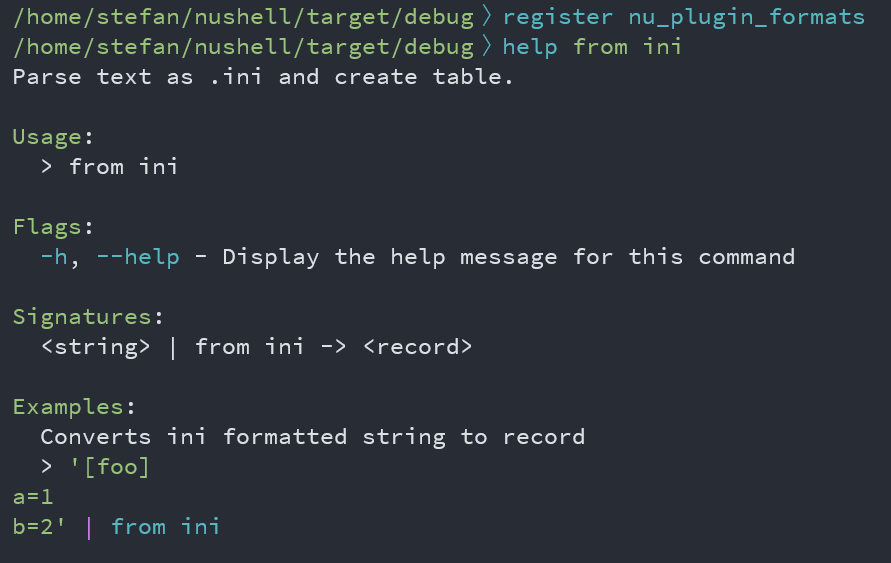Nushell 0.76
Nushell, or Nu for short, is a new shell that takes a modern, structured approach to your command line. It works seamlessly with the data from your filesystem, operating system, and a growing number of file formats to make it easy to build powerful command line pipelines.
Today, we're releasing version 0.76 of Nu. This release adds more commands for debugging, multiplication to clone strings, and moves some file formats to a plugin, thanks to better plugin support.
Where to get it
Nu 0.76 is available as pre-built binaries or from crates.io. If you have Rust installed you can install it using cargo install nu.
NOTE: The optional dataframe functionality is available by cargo install nu --features=dataframe.
As part of this release, we also publish a set of optional plugins you can install and use with Nu. To install, use cargo install nu_plugin_<plugin name>.
Themes of this release / New features
Debugging
We've added a few new commands to help with nushell debugging.
ast- Theastcommand works the same as before and produces an ast for any pipeline you give it.debug- Thedebugcommand works the same as before and produces some output about nushell values.explain- Provides detailed information about pipeline contents in a closure
The explain command attempts to explain to you how the pipeline, in the passed in block, is going to be interpreted. It shows the pipeline and command index, the looked up and found command name, the command argument data type, and argument details, among other things. Note that spans are also included and can be used with view span.

inspect- Immediately prints out the contents of a pipeline
The purpose of the inspect command is to help to debug pipelines. It works by allowing you to inject the inspect command into a pipeline at any point. Then it shows you what the input description is and what the input values are that are passed into inspect. With each step it prints this information out while also passing the value information on to the next step in the pipeline.

metadata- Themetadatacommand works the same as before.profile- Recursively profile pipelines and pipeline elements within a closure.
Enables fine-grained profiling of individual pipeline elements and recursively stepping into blocks/closures. The recursion depth can be controlled (default is 1) and it can optionally collect the profiled source segments for easier orientation and value in each step for easier debugging.

Note: There are known limitations that the profiler can't run. For example, it can't collect data from subexpressions and loop iterations. It is caused by profiling data being collected as pipeline metadata and a known bug that pipeline metadata is not preserved in some cases.
timeit(formerly known as benchmark, same functionality)
〉timeit { ls | sort-by name type -i | get name }
2ms 509µs 900nsview files- Lists source code inputs loaded into Nushell since the beginning of the session
view files lists the files and entries loaded into nushell's EngineState memory. Note the spans, for use with view span and the size of each file's contents stored.

view source(formerly known asview-source, same functionality)
〉def my-cmd [arg] { echo $arg }
〉my-cmd hi
hi
〉view source my-cmd
def my-cmd [ arg:any --help (-h) ] { echo $arg }view span- View contents of a span
Spans are important to nushell. One of their uses is to show where errors are. For instance, in this example below, the leader lines pointing to parts of the command line are able to point to 10, /, and "bob" because each of those items have a span.
〉10 / "bob"
Error: nu::parser::unsupported_operation (link)
× Types mismatched for operation.
╭─[entry #8:1:1]
1 │ 10 / "bob"
· ─┬ ┬ ──┬──
· │ │ ╰── string
· │ ╰── doesn't support these values.
· ╰── int
╰────
help: Change int or string to be the right types and try again.Example usage:
〉let a = 42
〉$a
42
〉metadata $a | get span
╭───────┬────────╮
│ start │ 113226 │
│ end │ 113228 │
╰───────┴────────╯
〉view span 113226 113228
42You can also find spans by using the debug --raw command.
〉$env.config | get keybindings | first | debug -r
... bunch of stuff
span: Span {
start: 68065,
end: 68090,
},
},
],
span: Span {
start: 68050,
end: 68101,
},
},
],
span: Span {
start: 67927,
end: 68108,
},
}
〉view span 67927 68108
{
name: clear_everything
modifier: control
keycode: char_l
mode: emacs
event: [
{ send: clearscrollback }
]
}
〉view span 68065 68090
{ send: clearscrollback }
〉view span 68050 68101
[
{ send: clearscrollback }
]In an effort to have a little more organization, we've assigned a category of Debug to all commands that participate in nushell script debugging. Here is a list of commands that are in that category now.
- ast
- debug
- explain
- inspect
- metadata
- profile
- timeit
- view
- view files
- view source
- view span
"Multiplication" of strings and lists is now supported. (WindSoilder)
Like in Python you can now use the multiplication operator * to create n concatenated copies of a string or list. Here n has to be an int value.
This can be useful if you want to quickly build ASCII art 😃! Note that the operation is commutative.
〉" NU " * 3
NU NU NU
〉3 * Shell
ShellShellShellIn the same spirit you can use it to quickly create lists with repeatedly the same element.
/home/stefan/nushell〉7 * [11]
╭───┬────╮
│ 0 │ 11 │
│ 1 │ 11 │
│ 2 │ 11 │
│ 3 │ 11 │
│ 4 │ 11 │
│ 5 │ 11 │
│ 6 │ 11 │
╰───┴────╯Community Question
We are interested in your feedback regarding the list multiplication. Does this match your expectations or do you want to use this operator overload more often to do scalar multiplication and look for numerical broadcasting support. Let us know!
Dataframe commands are again explicitly separated from core nushell commands. (#7998)
NOTE
The optional dataframe functionality is available by cargo install nu --features=dataframe or a distribution that includes that feature.
Dataframe commands have all been renamed in order to avoid confusion with nushell commands. It also makes our help commands less confusing. For instance, you can now do help select and understand how to use the traditional nushell select command and you can do help dfr select and understand how to use the dataframe specific select command. Previously this was a source of cryptic error messages that were confusing to users.
PATH vs Path (#8003)
We fixed a PATH vs. Path bug in completions, so now you should be able to do commands like cod<tab> and get completions like code and code.cmd across all operating systems.
More commands become plugins and plugins get first-class help support (WindSoilder, #7984, #7942)
In an effort to both make the core nushell binary smaller and to improve our plugins system along the way we moved the commands for several less common file formats to nu_plugin_formats.
To make sure you still have a first-class experience while using these commands, our plugins can now support code examples in the help and F1 menu.

As a result, plugin authors need to slightly update their command Signature to PluginSignature which supports the examples and recompile.
Improved error messages for int and string literals
Nushell now gives more specific and helpful messages when it detects syntax errors. In this release we've improved errors for string and int literals but we hope to improve more in the future. #7952
Errors in the format of escapes within double-quoted strings are reported specifically:
| Before | After |
|---|---|
| |
Invalid digits in radix-prefixed int literals are now flagged as a specific error. The old parser treated these invalid ints as bare strings:
| Before | After |
|---|---|
| |
General housekeeping in the Nu codebase (Hofer-Julian, fdncred, rgwood, sholderbach)
We are very lucky that we recently had a number of new contributors starting to help out with bug fixes and improvements to Nushell. We want to thank you and want to welcome you all!
In the background a number of contributors spent some time improving and refactoring the codebase to get us up-to-date and make it more approachable for newcomers. This includes work to break up less readable code in important places, and a significant effort to get us up-to-speed on some coding standards. We also updated a number of dependencies and want to continue to improve our dependency tree. We recently enlisted the relentless help of the dependabot. Furthermore, we enabled rudimentary tracking of test coverage through codecov.io. This should help us identify areas were additional tests are needed and can be a great contribution to the project.
Breaking changes
load-envcan not accidentally set$env.PWDanymore (#7963)- The
--numberedflag to enumerate entries has been removed fromeach,par-each,each while, andreduce. Use theenumeratecommand added in 0.75 instead. (#7777) - Plugin system:
nu_plugin::Plugin::signaturehas changed fromfn signature(&self) -> Vec<Signature>tofn signature(&self) -> Vec<PluginSignature>to support examples on plugin commands. Plugin authors have to update the relative structure to apply these changes. Normally you just need to perform a global search/replace fromSignaturetoPluginSignature, then rebuild and run with the latest nushell version. (#7984) benchmarkrenamed totimeit(#8018)dataframecommands renamed with a prefix ofdfr(#7998)view-sourcerenamed toview source(#7989)- Plugin commands can now include examples, which necessitated a change to the plugin signature, which causes all plugins to need to be recompiled for use. (#7984)
str lpadandstr rpadhave been superseded byfillin order to provide alignment (7846)from ini,from vcf,from ics,from emlcommands are moved to plugin callednu_plugin_formatsto reduce the number of commands in nushell core, you need to install and register the plugin manually to use these command. (#7942)http get-t,--timeoutparameter is now-m,--max-time(8088)- Filesystem commands now print to stderr when using
--verboseflag (8014) - The
parsecommand will now create 0 indexed columns instead of 1 indexed (7897)
Full changelog
Nushell
- amtoine created TEST: add the output to the new
with-envexample, and DOCUMENTATION: add a new "key-value" example towith-env, and remove the--encodingoption fromregisterin the examples - sholderbach created Pin
reedlineto0.16.0, and Add a script to generate coverage locally, and Bump version for0.76.0release, and Make patch coverage check informational only, and Add acodecov.ymlconfiguration, and Disable auto-benchmark harness for crates, and Minor clippy: inline format string, and Fix imported virtualenv testsuite, and Test return inreduceclosure from #7961, and Fixdef-envdocs according to docs#761, and Fix code in benchmarks, and Another shot at trying to setup codecov - fdncred created update code coversage script to work better with windows, and show more information when there are toml errors, and update link to command reference, and update colors in dark theme, and fix rename when it is passed an empty column list to rename, and allow date grouping in group-by, and move ast command to the debug group, and relocate debug commands, and update cargo wix to 0.3.4, and add benchmark to deprecated commands, and add a new inspect command for more debugging, and Make metadata a
Category::Debugcommand, and rename benchmark to timeit, and fix completions PATH vs Path, and Add dfr to dataframe cmds, and view span & view files commands, and report which datetime couldn't be converted, and explain command, and clean up the registry query output, and add ability to view-source on closures, and Afillcommand to replacestr lpadandstr rpad - WindSoilder created add usage for plugin commands, and update nu_plugin_python due to signature changes, and support multiplication operation on string and list values, and Make plugin commands support examples., and Move some
from xxxcommands to plugin, and make do -i works with liststream - bobhy created
string | fillcounts clusters, not graphemes; and doesn't count ANSI escape codes, and Improve error when regex rejects pattern. Resolution of #8037, and Syntax errors for string and int - dependabot[bot] created Bump actions-rust-lang/setup-rust-toolchain from 1.3.7 to 1.4.2, and Bump sysinfo from 0.27.7 to 0.28.0, and Bump winreg from 0.10.1 to 0.11.0, and Bump roxmltree from 0.17.0 to 0.18.0, and Bump rstest from 0.15.0 to 0.16.0, and Bump proptest from 1.0.0 to 1.1.0, and Bump openssl-src from 111.22.0+1.1.1q to 111.25.0+1.1.1t, and Bump actions-rust-lang/setup-rust-toolchain from 1.3.5 to 1.3.7, and Bump fs_extra from 1.2.0 to 1.3.0, and Bump ical from 0.7.0 to 0.8.0, and Bump which from 4.3.0 to 4.4.0, and Bump tokio from 1.24.1 to 1.25.0
- zhiburt created Add colors in
table --collapse, and nu-table/ Fix table --expand issue when table with no header involved , and nu-table/ table --collapse style fix, and Address #7997 - kubouch created Revert #7779 (enables back subcommand completions), and Fix hidden env vars not being hidden in closures, and Reorder
help <keyword>priority, and Benchmark each pipeline element - jaudiger created Factorize HTTP commands code, and http: add
--insecureflag tohttp get, share common code, and Update few examples of math commands, and Use imported names inCommand::runsignatures - stormasm created remove spurious use from default_context.rs
- sophiajt created Bare word improvements
- ryand67 created #8027 Hide implementation details in invalid cd call
- rgwood created Check ctrl+c when collecting a RawStream, and Make ++ operator work with strings and binary values, and Windows: handle illegal filenames a little better, and Fix $nu path separators on Windows, and Add comment explaining background thread usage for plugin calls
- NotLebedev created Filesystem commands print --verbose to stderr
- initinll created Added fix for #7981 - Replaced crate serde_ini with rust-ini for package nu-command/from, and Added fix for #7970 - Upgraded toml crate version from version from 0.5.8 to 0.7.1 for package nu-command
- bgeron created Clarify two config fields
- Hofer-Julian created Extract run blocks into functions, and Fix copy paste error
- Mehrbod2002 created Load env pwd, and Validate input range of
duflags, and Fix: dst error on cp command - nabacg created return in reduce command closure
- webbedspace created Only abbreviate to "[table x rows]" if every value is a record, and Remove deprecated
--numberedflag from four commands - csko created use newer reedline (once available), and respect use_ansi_coloring configuration
- merelymyself created allow
parseto work better with streams, and ensure that when nu evaluates files, it allows early returns - dmatos2012 created Support URLs in
startcommand
Extension
- glcraft created Fix
usesyntax - kecrily created feat: add icon for
.nuextension in VS Code
Documentation
- WindSoilder created Add breaking change, and Add breaking change for plugin signature
- Hofer-Julian created Prepare for generation of categories, and Move
book/commandstocommands/commands, and Move command reference to navbar - hustcer created fix #768 for zh-CN translation, and fix
allandanyusage examples, close #758, and fix #781 and update some node modules, and Update some vuepress plugins, and Update typos config and fix some typos, and feat: refresh command docs for nu v0.75 - msmart created Fix typos in plugins.md
- kubouch created Add
profilenote and screenshot - bobhy created release notes for #7952
- jafriyie1 created Fix: updating pages that used each -n command, and Fix changed history command to match default in config
- FilipAndersson245 created replaces fetch with http in various places, and Updated cookbook with http get instead of fetch.
- das-g created [pt-BR] fix statement about
linesoutput type ("tabela"→"lista"), and [es] fix statement aboutlinesoutput type ("tabla"→"lista"), and fix statement aboutlinesoutput type ("table"→"list")
Nu_Scripts
- sholderbach created Update release script to
nu_plugin_formats - amtoine created FEATURE: export all the math functions to use them in
nushell, and FIX: the math functions can not beused - fdncred created just a base64 encoder written for fun, and update scripts from fetch to http get
- hyiltiz created Fix space-in-path issue and extra / at root, and Fix abbrev logic, and Update to 0.75.1 syntax
- maxim-uvarov created add a current session history menu
- Tiggax created Updated the temp.nu for 0.60.0+, and Update Check-if-env-exists to use the envs_dirs from conda info
- WindSoilder created update themes' readme
- Neur1n created added nu_msvs module
reedline
- sholderbach created Bump version for
0.16.0release., and Bumprstestto 0.16 - rgwood created VACUUM after deleting SQLite data, and Add History::clear() function
- fdncred created add history-clear to demo
- csko created Fix columnar menu completion corrupting the editor insertion point